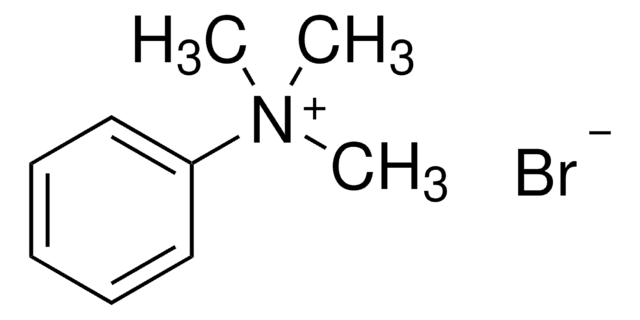79267
Trimethylphenylammonium hydroxide solution
~25% in H2O (1.68 M)
Synonym(s):
Phenyltrimethylammonium hydroxide, TMAH
Sign Into View Organizational & Contract Pricing
All Photos(1)
About This Item
Linear Formula:
(CH3)3N(OH)C6H5
CAS Number:
Molecular Weight:
153.22
Beilstein:
3917033
MDL number:
UNSPSC Code:
12352005
PubChem Substance ID:
NACRES:
NA.22
Recommended Products
form
liquid
Quality Level
concentration
~25% in H2O (1.68 M)
refractive index
n20/D 1.395
functional group
amine
SMILES string
[OH-].C[N+](C)(C)c1ccccc1
InChI
1S/C9H14N.H2O/c1-10(2,3)9-7-5-4-6-8-9;/h4-8H,1-3H3;1H2/q+1;/p-1
InChI key
HADKRTWCOYPCPH-UHFFFAOYSA-M
Looking for similar products? Visit Product Comparison Guide
Related Categories
General description
Trimethylphenylammonium hydroxide solution (TMPAH) is a quaternary ammonium compound that is commonly used as a strong base in organic synthesis. It is also used as a deprotecting agent for the removal of t-butoxycarbonyl (Boc) groups from amino acids or peptides and benzyl protecting groups from alcohols or amines.
Application
Trimethylphenylammonium hydroxide solution can be used to initiate the polymerization of the monomer 1,8-dihydroxymethyl-1,3,5,7-octatetrayne (DHOT) for the preparation of polymer nanospheres. It is also used as a base in the synthesis of alkyl 3-nitroacrylates via aldol reaction with nitroacetaldehyde or nitroacetone.
Signal Word
Danger
Hazard Statements
Precautionary Statements
Hazard Classifications
Eye Dam. 1 - Skin Corr. 1B
Storage Class Code
8A - Combustible corrosive hazardous materials
WGK
WGK 3
Flash Point(F)
Not applicable
Flash Point(C)
Not applicable
Personal Protective Equipment
dust mask type N95 (US), Eyeshields, Gloves
Choose from one of the most recent versions:
Already Own This Product?
Find documentation for the products that you have recently purchased in the Document Library.
Customers Also Viewed
Fazel Abdolahpur Monikh et al.
Nature communications, 12(1), 899-899 (2021-02-11)
Analytical limitations considerably hinder our understanding of the impacts of the physicochemical properties of nanomaterials (NMs) on their biological fate in organisms. Here, using a fit-for-purpose analytical workflow, including dosing and emerging analytical techniques, NMs present in organisms are characterized
Estefanía Noriega-Fernández et al.
Foods (Basel, Switzerland), 10(3) (2021-04-04)
The aim of this work was to evaluate the potential of ultrasound (US), alone or in combination with mild heating and/or EDTA towards reduction of As, Cd, I, and Hg content of Laminaria hyperborea. Concentrations of As, Cd, I, and
Seungjoon Chung et al.
International journal of environmental research and public health, 17(12) (2020-06-25)
This study describes an immobilization method of enriched microorganism, for robustly degrading organic compounds, including tetramethyl ammonium hydroxide (TMAH) in electronics wastewater without an increase of total organic carbon (TOC) in effluent. The enriched TMAH degrading bacteria was entrapped inside
Y El-Nahhal et al.
Journal of agricultural and food chemistry, 48(10), 4791-4801 (2000-10-29)
This study aimed to design formulations of hydrophobic herbicides, alachlor and metolachlor, by adsorbing them on the clay mineral montmorillonite preadsorbed by the small organic cation phenyltrimethylammonium (PTMA). An adsorption model that considers electrostatics and specific binding and the possibility
Jie Zhang et al.
Journal of chromatography. A, 1216(44), 7527-7532 (2009-04-07)
A method has been established for the determination of four pharmaceutically active compounds (ibuprofen, ketoprofen, naproxen and clofibric acid) in water samples using dynamic hollow fiber liquid-phase microextraction (HF/LPME) followed by gas chromatography (GC) injection port derivatization and GC-mass spectrometric
Our team of scientists has experience in all areas of research including Life Science, Material Science, Chemical Synthesis, Chromatography, Analytical and many others.
Contact Technical Service










